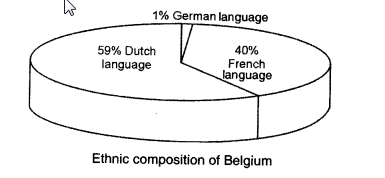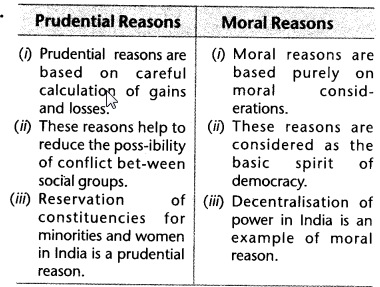Formulae Handbook for Class 10 Maths and Science
Social Sciences CBSE Class 10 Civics Power Sharing SAQ
Q.1. What led to the ethnic tension in Belgium ? Why was it more acute in Brussels ?
Ans. The minority French-speaking community was relatively rich and powerful. So the Dutch speaking community, who got the benefit of economic development and education much later showed the resentment between the Dutch-speaking and the French-speaking communities during the 1950s and the 1960s. The conflict between the two communities was more severe in Brussels because the Dutch speaking people constituted a majority in the country, but a minority in the capital.
Q.2. What is the ethnic composition of Belgium ? [CBSE Sept. 2011]
Or
Describe the ethnic composition of Belgium. [CBSE 2012]
Ans. The ethnics composition of Belgium, a small country is very complex. Of the country’s total population, 59 per cent live in the Flemish region and speak Dutch language. Another 40 per cent people live in the Wallonia region and speak French. Remaining 1 per cent of the Belgians speak German. In the capital city, Brussels, about 80 per cent people speak French while 20 per cent are Dutch-speaking.
More Resources for CBSE Class 10
- NCERT Solutions
- NCERT Solutions for Class 10 Science
- NCERT Solutions for Class 10 Maths
- NCERT Solutions for Class 10 Social
- NCERT Solutions for Class 10 English
- NCERT Solutions for Class 10 Hindi
- NCERT Solutions for Class 10 Sanskrit
- NCERT Solutions for Class 10 Foundation of IT
- RD Sharma Class 10 Solutions
Q.3. What is the ethnic composition of Sri Lanka ?
Ans. Sri Lanka has a diverse population. The Sinhalese community forms the majority of the population (74%) with Tamils (18%) who are mostly concentrated in the north and east of the island, forming the largest ethnic minority. Other communities include the Muslims. Among Tamils, there are two sub-groups. The Tamil natives of the country are called ‘Sri Lankan Tamils’ (13 %). The Tamils, who were brought as indentured labourers from India by British colonists to work on estate plantations are called the ‘Indian Origin Tamils’ (5%). Most of the Sinhala-speaking people are Buddhists, while most of the Tamils are Hindus or Muslims. There are about 7 per cent Christians, who are both Tamil and Sinhalese.

Q.4. Mention any four steps which were taken by the Sri Lankan government to achieve majoritarianism. [CBSE Sept. 2010, 2012]
Ans. (i) In 1956, an Act was passed under which English was replaced as the country’s official language not by the Sinhala and Tamil but by the Sinhala only.
(ii) The governments followed preferential policies that favoured the Sinhala applicants for university positions and government jobs.
(iii) A new constitution stipulated that the state shall protect and foster Buddhism.
(iv) Denial of citizenship to estate Tamils.
Q.5. What is a Civil War? Explain with context to Sri Lanka.
Ans. (i) It is a violent conflict between the opposing groups within a country, for example the Sinhalese and the Tamils.
(ii) Due to the violent conflict between both these ethnic groups thousands of people of both the communities have been killed. Many families were forced to leave the country as refugees and many more lost their livelihoods.
(iii) The civil war has caused a terrible setback to the social, cultural and economic life of the country.
Q.6. What is community government ? Explain the concept of community government with context to Belgium. [CBSE 2014]
Ans. (i) A community government is one in which different social groups are given the power to handle the affairs related to their communities. They are expected to work jointly for the benefit of the common masses without undermining any one community.
(ii) The ‘community government’ is elected by people belonging to one language community-Dutch, French and German speaking – no matter where they live.
(iii) This government has the power regarding cultural, educational and language-related issues.
Q.7. What is the relationship between democracy and power sharing ?
Ans. ‘Democracy’ means giving every citizen the right and power to make the decisions through their elected representatives. Power sharing is dividing power among various social groups to give them equal representation in the governance. Power sharing is the essence of democracy where every individual, irrespective of cultural and language differences feel involved in the political system.
Q.8. How did the Sri Lankan and the Belgium government try to solve the ethnic problem ?
Or
Explain any two important differences between the power sharing model accepted by Belgium and Sri Lanka. [CBSE 2013]
Ans. (i) The Belgium leaders tried to solve the ethnic problem by respecting the feelings and interests of different communities and regions, whereas the Sri Lankan government tried to solve the problem through majoritarianism.
(ii) Belgium leaders established a federal structure under which power was shared between the Union Government and its other constituent units whereas Sri Lankan leaders adopted Unitary Government structure.
(iii) The Belgium solution helped in avoiding civic strife whereas the majoritarianism in Sri Lanka led to the civil war.
Q.9. “Both Belgium and Sri Lanka are democracies but they follow different systems of power¬sharing. ” Support the statement by giving three points of difference. [CBSE 2012]
Ans. (i) Type of Government: Sri Lanka continues to be, for all practical purpose, a unitary system where the national government has all the powers. Tamil leaders want Sri Lanka to become a federal system under which the regional governments were given constitutional powers that were no longer dependent on the central ‘government. Belgium shifted from a unitary to a federal form of government.
(ii) Religion and Government : To accommodate people belonging to different ethnic groups Belgium formed a ‘community government’ whereas Sri Lankan government passed a law to protect and promote Buddhism.
(iii) Language and government : In 1956 Sri Lankan government passed an act to recognize Sinhala as the only official language whereas Belgium government “tried to protect and foster all the languages spoken by the people.
Q.10. What is power sharing ? Explain.
Ans. (i) The concept of providing a permanent share of power in the government different communities or regions is termed as power sharing.
(ii) Under this the people and the leaders of the nation respect the feelings and interests of different commodities and regions.
(iii) The principle of power sharing is very important for the unity and growth of democracy.
Q.11. Explain the principle of federal division of power.
Ans. (i) Under the federal division of power the power is divided among different levels of government ; for example in India the power is shared among the three levels of governments, i.e., Union government, the state governments and the local governments.
(ii) This type of system is known as vertical division of power.
(iii) Under this the Constitution clearly lays down the power of each level of government
Q.12. “Power may also be shared among different social groups”. Explain by giving examples.
Ans. (i) Power may also be shared among different social groups such as the religious and linguistic groups. ‘Community government’ in Belgium is a good example of this
arrangement.
(ii) In some countries there are constitutional and legal arrangements whereby socially weaker sections and women are represented in the legislatures and administration. For example in India we follow the principle of ‘reserved constituencies’ in assemblies and the parliament of our country. This type of arrangement is meant to give space in the government and administration to diverse social groups who otherwise would feel alienated from the’ government.
(iii) This method is used to give minority communities a fair share in power.
Q.13. What is the difference between prudential and moral reasons for power sharing ?
Ans.
